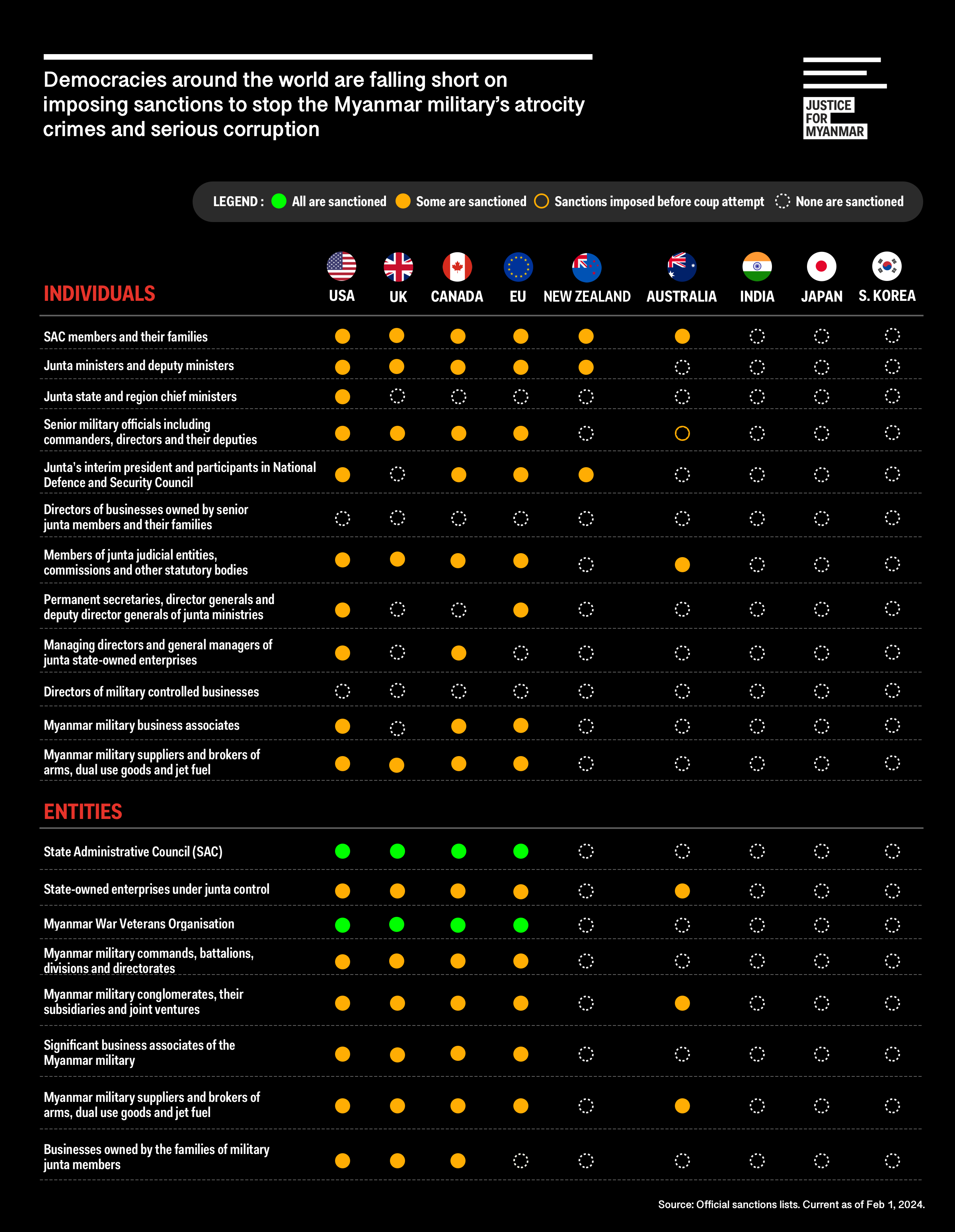International sanctions since the Myanmar military’s illegal attempted coup

Justice For Myanmar has compared targeted sanctions imposed by democracies on the illegal Myanmar junta, its businesses and those complicit in its crimes. Targeted sanctions are a crucial mechanism to stop the flow of funds, arms, equipment, technology and jet fuel to the junta and to take action against those responsible for human rights violations and corruption.
We looked at the sanctions track records of Australia, Canada, the EU, India, Japan, New Zealand, South Korea, the UK and USA since February 1, 2021.
Comparison of sanctions designations by country (updated February 1, 2024): Download Excel File

Appallingly, since the Myanmar military’s attempted coup, India, Japan and South Korea have not imposed any targeted sanctions.
Companies and governments from those countries are implicated in ongoing business with the military junta.
For instance, the Japanese state-backed Y Complex project involves payments to the Myanmar Army’s Office of the Quartermaster General, although payments have reportedly been suspended since February 1, 2021.
The Shwe Gas project, which involves a collaboration between South Korea’s state-owned company, KOGAS, POSCO International and the junta-controlled Myanma Oil and Gas Enterprise (MOGE), bankrolls the junta.
The majority state-owned Bharat Electronics Limited has repeatedly transferred equipment to the Myanmar military since its attempted coup.
Business with the junta and its conglomerates enables its widening campaign of terror.
Through their inaction – at best – and complicity, at worst, India, Japan and South Korea are failing to uphold their human rights responsibilities and failing the people of Myanmar. We call on them to change direction and support democracy and human rights in Myanmar.
Since the military’s illegal coup attempt, Australia has only imposed two rounds of sanctions against seven entities and 16 members of the junta. Despite the significant involvement of Australian-owned and led companies in the mining sector, Australia has so far failed to sanction any junta-controlled agencies or key individuals involved in mining.
While New Zealand acted swiftly to formally suspend high-level contact with the Myanmar military junta, it too has failed to follow this up with targeted sanctions, with the exception of travel bans imposed in 2021 and 2022 on a total of 21 people. This is insufficient. New Zealand does not have a Magnitsky law.
Rounds of sanctions have been imposed by the USA, UK, Canada, EU, Australia and New Zealand on some senior junta individuals, junta-controlled enterprises, arms brokers and cronies. Yet, sanctions have lacked coordination and have failed to cover whole networks of companies. Not nearly enough has been done to designate individuals and entities that continue to provide the junta with funds, arms, equipment, technology and jet fuel.
For instance, despite evidence that oil and gas bankrolls the military junta, enabling its continued atrocity crimes, only the EU has fully sanctioned MOGE, while the USA has prohibited financial services with it. MOGE is a state-owned enterprise illegally under Myanmar military control that is the junta’s single biggest source of foreign revenue.
Many key military-controlled businesses, their directors and associates have also yet to be sanctioned, despite their well-documented links to the Myanmar military’s international crimes.
A notable example is Telecom International Myanmar, the company that owns the Mytel mobile network that is not yet sanctioned in any jurisdiction. Mytel provides a lucrative source of revenue for the terrorist junta and supports the military’s communications and surveillance capabilities. It is co-owned by the military conglomerate Myanmar Economic Corporation (MEC), which is sanctioned by Australia, Canada, the EU, UK and USA.
Few sanctions have been imposed on crony individuals and businesses that provides the military with funds. Notable exceptions include the UK and EU’s sanctions against International Group of Entrepreneur (IGE) and the USA and Canada’s sanctions against Shwe Byain Phyu.
Targeted sanctions are an important tool for the international community to deploy in support of the Myanmar people’s rejection of the attempted coup and struggle to build a federal democracy.
Justice For Myanmar continues to call for wide-ranging international action, including targeted sanctions and a global arms embargo.
Explore the evidence
Australia’s Autonomous Sanctions (Designated and Declared Persons – Myanmar) list
Canada Special Economic Measures (Burma) Regulations consolidated
EU Restrictive Measures against Myanmar sanctions map
New Zealand Ministry of Foreign Affairs and (March 23, 2021 and February 1, 2022)
US Commerce Department’s Export Administration Regulations Entity List
US Treasury Office of Foreign Asset Control sanctions list search

